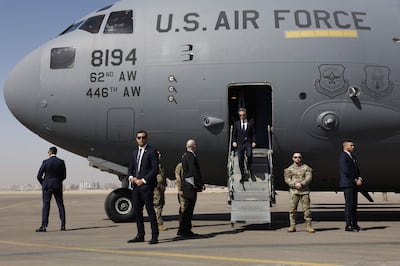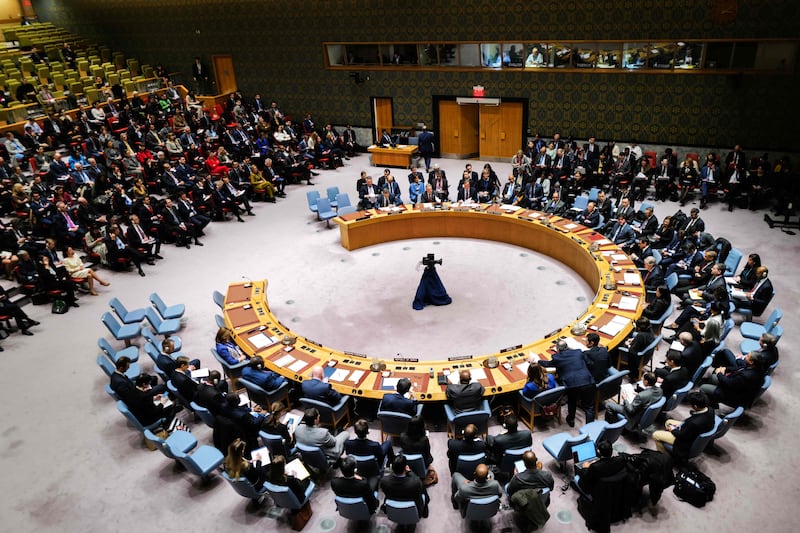On learning that the US tabled a draft UN Security Council resolution on Wednesday calling for an immediate ceasefire in Gaza, some may be tempted to think: “Better late than never.” But the human cost of this war – The Nationalreported on Thursday that more than 800 Palestinians have been killed in Gaza since the start of Ramadan – makes clear the lethal consequences of diplomatic failure.
Security Council resolutions may be legally binding, but several countries – including Israel – have ignored them in the past. Many people who want to see an immediate halt to the bloodshed will understandably wonder what practical benefit such a resolution would have for the 2.3 million Gazans living in fear of their lives. Nevertheless, the fact that it is the US, Israel’s main backer, which is now endorsing calls for a ceasefire is significant, particularly when one looks at the wider pressure being exerted on Israel’s bellicose leadership.
There is increasing divergence between the White House and the Israeli government. US President Joe Biden has publicly described an Israeli military assault on the overcrowded Gazan city of Rafah as a mistake. One of Mr Biden’s political supporters, Senate Majority Leader Chuck Schumer – a senior pro-Israel figure in Washington – recently described Israeli Prime Minister Benjamin Netanyahu as an obstacle to peace. Washington has also held talks with one of Mr Netanyahu’s main political rivals, Israeli war cabinet member Benny Gantz.

But pressure on the Israeli government is coming from other quarters, too. Canada's decision this week to suspend future arms exports to Israel may not be a major move in terms of weaponry – Ottawa is not a major supplier to Israel’s armed forces – but it was a significant warning shot from a long-term western ally. Elsewhere, Israel appears to be losing control of the narrative as prominent international actors make clear their objections to the Gaza war.
Last month, EU foreign affairs chief Josep Borrel urged Israel’s allies to stop sending it weapons. Last week, Dr Tedros Adhanom Ghebreyesus, the head of the World Health Organisation, appealed to Israel “in the name of humanity” not to attack Rafah. And on Monday, UN Secretary General Antonio Guterres said Palestinians in Gaza were enduring “horrifying levels of hunger and suffering”. His position was echoed a day later by the World Bank, which said half of Gaza’s population is at risk of famine.
This cascade of political, military and diplomatic pressure could soon be joined by a Security Council resolution that calls for an immediate ceasefire and the release of hostages. Such a call should have been endorsed and acted upon a long time ago; many Palestinian civilians have paid for the delay with their lives. Nevertheless, we may be beginning to see the tide turn – in this case, the US moving from a position where it vetoes ceasefire resolutions to tabling them.
When it comes to a response, the ball is not solely in Israel’s court. Contained in the US-sponsored draft – alongside “an immediate and durable ceasefire to protect civilians on all sides, enable the delivery of essential humanitarian aid and alleviate suffering” – is a call to release the remaining Israeli hostages being held by Hamas and other militant factions. Taking hostages is war crime, and these individuals – along with Palestinian detainees held by Israel – must be released. Palestinian factions must respond responsibly to calls for a ceasefire, no matter how delayed such calls may be.
There is an opportunity for progress today, as US Secretary of State Antony Blinken, currently on his sixth visit to this region since October 7, arrives in Israel for talks. Next week, Israeli Defence Minister Yoav Gallant is expected to meet US Defence Secretary Lloyd Austin at the Pentagon, an encounter that provides another opportunity for some straight talking from Israel’s main backer.
Much uncertainty remains but whatever the next steps may be, they must happen quickly; Gazans, many of whom are starving to death, do not have the luxury of time. The wheels of diplomacy must turn more quickly.





